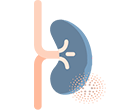Alport Syndrome Precision Panel
Alport Syndrome (AS) is a progressive hereditary renal disease characterized by sensorineural hearing loss, ocular abnormalities and increased risk of chronic kidney failure.


The clinical utility of this panel is:
Nozu, K., Nakanishi, K., Abe, Y., Udagawa, T., Okada, S., Okamoto, T., Kaito, H., Kanemoto, K., Kobayashi, A., Tanaka, E., Tanaka, K., Hama, T., Fujimaru, R., Miwa, S., Yamamura, T., Yamamura, N., Horinouchi, T., Minamikawa, S., Nagata, M., & Iijima, K. (2019). A review of clinical characteristics and genetic backgrounds in Alport syndrome. Clinical and experimental nephrology, 23(2), 158–168. https://doi.org/10.1007/s10157-018-1629-4
Kashtan C. E. (2021). Alport Syndrome: Achieving Early Diagnosis and Treatment. American journal of kidney diseases : the official journal of the National Kidney Foundation, 77(2), 272–279. https://doi.org/10.1053/j.ajkd.2020.03.026
Savige, J., Gregory, M., Gross, O., Kashtan, C., Ding, J., & Flinter, F. (2013). Expert guidelines for the management of Alport syndrome and thin basement membrane nephropathy. Journal of the American Society of Nephrology : JASN, 24(3), 364–375. https://doi.org/10.1681/ASN.2012020148
Zhang, Y., & Ding, J. (2017). Renal, auricular, and ocular outcomes of Alport syndrome and their current management. Pediatric Nephrology, 33(8), 1309-1316. doi: 10.1007/s00467-017-3784-3
Gross, O. (2008). Understanding renal disorders as systemic diseases: the fascinating world of basement membranes beyond the glomerulus. Nephrology Dialysis Transplantation, 23(6), 1823-1825. doi: 10.1093/ndt/gfn129
Savige, J., Ariani, F., Mari, F., Bruttini, M., Renieri, A., Gross, O., Deltas, C., Flinter, F., Ding, J., Gale, D. P., Nagel, M., Yau, M., Shagam, L., Torra, R., Ars, E., Hoefele, J., Garosi, G., & Storey, H. (2019). Expert consensus guidelines for the genetic diagnosis of Alport syndrome. Pediatric nephrology (Berlin, Germany), 34(7), 1175–1189. https://doi.org/10.1007/s00467-018-3985-4